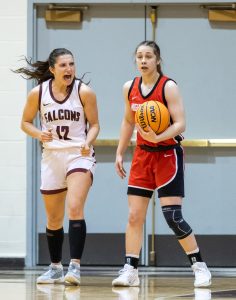
Leadership plays a crucial role in sports. Without proper guidance or a direction to shoot for, a team is almost certain to crumble.
Senior forward and communications major Shaw Anderson, a co-captain of the men’s basketball team, recounted how he learned to be a great leader from watching the team’s past captains.
“I was fortunate enough when I was a freshman and sophomore [to have] really good leaders. I try to just be like them [and] just kind of pass down the culture that was good when I got here,” Anderson said.
Senior business management major Maui Sze, a forward for the men’s basketball team and Anderson’s co-captain, explained that his position felt natural to him, but the team’s acceptance was more crucial than his skill.
“I’ve always been very talkative and outgoing, so it came naturally,” Sze said. “I felt like the team kind of appointed me as a leader, but I definitely think a lot of it comes from the team. I think the team sees certain guys doing certain things and they feel positive vibes [them], and that’s the guy that people want. A leader must be approved by all for the team.”
Anderson identified uniting the team against different challenges every weekend as the most challenging aspect of leading them.
“Basketball games are hard. There’s a lot of things and a lot of opponents trying to get in the way of you winning,” Anderson said. “The hardest part is bringing all five guys on the court, making sure we’re all on the same page and staying together. When one person messes up, you try to bring them back into that group to focus on the next play.”
Senior co-captain for women’s basketball, Hailey Marlow, a senior business administration major, explained how she manages the balance between advocating for the coaches and advocating for the team.
“We create a space [where] the girls know what’s most important is the bond that they make … making sure we hold everybody accountable and being our sister’s keeper,” Marlow said. “[Also] being that bridge for both the coach and the players, it’s difficult when you need to advocate for both sides and you don’t want to upset either side. Being a leader is speaking your truth and speaking of values that are going to positively impact the [team], and sometimes that means doing what is not always liked by everybody [or] doing what you don’t like to make sure you’re acting in the interest of others.”

As much responsibility as they have, captains do not lead by themselves. Head coach for the women’s basketball team Mike Simonson emphasized the importance of coordination between captains and coaches.
“Captains serve two purposes: one, they keep you motivated and uphold your team standards; two, they make sure everything behind the scenes gets done within the team. I always look at captains as an extension of the head coach,” Simonson said. “We have to be on the same page [and] captains are the caretakers of the program. In the locker room, they’re the ones making sure that the characteristics we want to preach and be about [are] carried out when the coach isn’t around.”
For all their efforts to help their teams grow, leaders grow and become better as much as their peers do. Volleyball co-captain and setter Emily Tulino, a junior nursing major, expanded on how leaders and their teams evolve side-by-side.
“It’s propelled my growth as a person in general. It’s forced me into different conversations and positions and even [improved] my work ethic on the court,” Tulino said. “[I] have stepped into a leadership role, yes, but we have a lot of leaders on our team because we have such an experienced team.”
Through everything, Sze’s focus as a leader is to always be true to the person the team appointed and not become anyone different.
“One of the key things is still being myself. There’s a little stretch of the year where I lost confidence in myself, and the guys [told] me that they need me to still be myself and be that leader again and be that voice in the locker room that sets the energy and sets the tone,” Sze said. “I have a big role in the team and the guys look up to me, so I gotta continue to be myself regardless if I’m playing good or playing bad.”
The abilities of a leader shine in their actions as much as their uplifting words. Holding the position at the head of the team and becoming a bridge between coaches and peers requires a special fortitude that everyone else on the team cannot help but respect.
“[All of] these kids have been so loyal and dedicated to the program and that’s why their captains,” Simonson said. “[We] completely trust [them] in every circumstance, and we’ve been through a lot of life together and been on the same page through a lot of things. It’s really been fun coaching and being with [them] because we [all] have a special bond.”





















































































